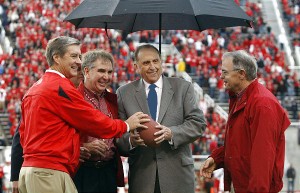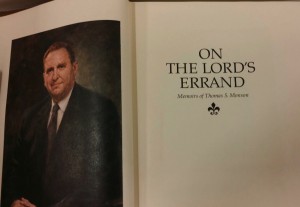It wasn’t long ago when an advertising campaign for basketball superstar Michael Jordan emphasized just three words: “Be like Mike.” The slogan became very popular and sold plenty of shoes.
 This came to my mind as I read an article titled “Follow the Prophet” in the April 2014 Ensign magazine. Written by Seventy William R. Walker, the piece puts the LDS president on a pedestal. If the reader wanted to predict what the article would be about, the pull quote on page 39 says it all: “As we follow President Monson and try to be more like him, we will inevitably succeed in being more faithful disciples of the Lord Jesus Christ.” Somewhere I was halfway expecting another pull quote that would have read, “Be like Tom.”
This came to my mind as I read an article titled “Follow the Prophet” in the April 2014 Ensign magazine. Written by Seventy William R. Walker, the piece puts the LDS president on a pedestal. If the reader wanted to predict what the article would be about, the pull quote on page 39 says it all: “As we follow President Monson and try to be more like him, we will inevitably succeed in being more faithful disciples of the Lord Jesus Christ.” Somewhere I was halfway expecting another pull quote that would have read, “Be like Tom.”
Consider the points made by Walker to succeed in “following the prophet’s example”:
- Be positive and happy
- Be kind and loving toward children
- Follow the promptings of the Spirit
- Love the temple
- Be kind, considerate, and loving
Toward the end of the article, Walker writes on page 41, “President Monson has taught us the way to live our lives with his wonderful and inspiring messages at general conference. He has taught us how to be followers of Jesus Christ by his remarkable and wonderful personal example. . . . As we follow him and try to be more like him, we will inevitably succeed in being more faithful disciples of the Lord Jesus Christ.”
Someone may predict that I am about to insist that it is wrong to imitate other people. That’s not my point. If a person’s walk is worthy to be imitated, then by all means it should be! For the Christian, this might be a pastor, Billy Graham, or another spiritual giant. Even Paul urged the Corinthians to “imitate me” (1 Cor. 4:16) and “follow my example, as I follow the example of Christ” (1 Cor. 11:1). In Philippians 4:17, the apostle wrote, “Join together in following my example, brothers and sisters, and just as you have us as a model, keep your eyes on those who live as we do.”
Was Paul perfect? By no means! He was a man who was transparent and even admitted to struggling with sin! (Rom. 7:7-25) Flip through the book of Acts and study how Paul handled certain situations, including a serious conflict with Peter. Read 2 Corinthians 11 and better understand the mindset of the man who told us to imitate him. There is much open transparency when it comes to the life of Paul.
Contrast Paul’s example with President Monson. Besides photo ops and generic biannual speeches at the general conferences, how much transparency is provided? Of course, there are plenty of PR pieces to make Monson look saint-like (example). And there is a 2010 biography (To the Rescue written by Heidi S. Swinton, a faithful member of the LDS Church), though the chapter titles (including “He went about doing good” and “The consummate counselor”) show the demeanor of this book. We must wonder if there really is enough information provided to give us an accurate assessment of his character. Could the image we are given be nothing more than a caricature?
Someone might say that we can learn more about the real Monson from General Conference messages that he’s given over the years. I have read or listened to many Monson addresses, and I just can’t remember a time when I heard him refer to situations where his current life or example was less than stellar. Oh, we certainly get some tales, including one that has been dubbed the “fire story.” It details a time when Monson and a friend got into trouble when they played with matches and started a fire. While this certainly was an admission of wrongdoing, I believe the narrative is presented in a way that appears innocent and cute, even if the moral of the story was to obey. (See the April 2013 account here.)
Except for certain long-ago stories like this, very little is shared at conference that provides an accurate picture of the 21st century Monson. The impression that is given—purposeful, I believe—reflects a mortal who appears to have a lock on sainthood.
We are left to wonder, does Mormonism’s top leader struggle with evil, lustful thoughts? Does he have any temptation with gossip or backbiting talk? Has he disagreed with one of his children and spoken in an angry tone? In other words—and I want to know—is Thomas S. Monson human? After reading Walker’s article, the top LDS leader appears to be a demigod who apparently walks on water.
 In a 1985 book titled On the Lord’s Errand: Memoirs of Thomas S. Monson that has long since been out of print, Monson reminisced about a time when he was given advice from a senior apostle. He wrote on page 184:
In a 1985 book titled On the Lord’s Errand: Memoirs of Thomas S. Monson that has long since been out of print, Monson reminisced about a time when he was given advice from a senior apostle. He wrote on page 184:
“In about 1956 we recognized that our neighborhood was deteriorating. We observed this one Halloween by the nature of the people who came in the guise of ‘Trick or Treat.’ The minority elements were moving into the area where we lived, and many of the old-time families had long since moved away. Seeking counsel, I visited with Mark E. Peterson, who for many years had been the General Manager of the Deseret News. O. Preston Robinson, my former professor of marketing at the University of Utah, had succeeded Brother Petersen as the General Manager at the News. As I mentioned to Mark my dilemma, wondering if it would be unfair for me to move, he said simply, ‘Your obligation to that area is concluded. Why don’t you build a house in my ward?’”
By telling the story, Monson doesn’t appear to have any remorse referring to human beings as “the minority element.” He doesn’t seem to feel bad that he took Petersen’s advice to move away from these “elements.” Maybe this is why the story has never made it into a conference address. At the same time, I wonder, should we consider this as an example of how we ought to “follow the prophet”?

I have a question for all Ex-Mormons and any currant active ones willing to help me out.
I really want to interview some MM live on my show, they will sit in with me and answer questions. A few weeks ago I stopped a few on the street and asked them if they would be up for it, they said they cannot and gave no other reason.
Well today I stopped two more on the street and they also said no, but they said it is against their rules, I said, you mean I can have you over my house, ask you questions and that’s OK, But as soon as it turns to a radio show I cannot? They said, Yep that’s it.
They claim it’s in their rules book.
Question, Is this true, in the MM rules book, active Mormons on a mission cannot be interviewed live on radio or TV? If so, why not? Thanks. Rick
RickB,
The role of the missionary is to proselytise to people on a ‘private’ basis not ‘public’ (can’t think of a better way of putting it). This means that they can teach in homes or on the streets but not on radio or tv. That is the role of the PR department and the GAs and maybe even mission presidents. As far as if its written in the rule book, mine is in the garage and its almost midnight here so I am not going out to try and find it but if you want to I will.
Ralph, you dont have to. I would think though if your looking to proselytize as you say, you could reach more people via the raido or tv. Plus. We do see ad’s on tv or the internet doing exactly that. Also I see MM breaking rules all the time. They claim they cannot use the internet, yet me and friends have seen them in libraries and coffeehouses using them.
Ralph, One more thought.
It has been proven here on this Blog, Mormons lie to push their agenda, Both by Mormon posters here being busted for lying and using deceptive tactics, and among high ranking church members. So I just find it funny, lie for the Lord, but dont allow some young kid MM to go onto TV or radio, might it be that they will be shown the truth or learn about all these things the church tries to hide from them?
Ralph said , ” This means that they can teach in homes or on the streets but not on radio
or t.v. That is the role of the PR Dept and the GA’s….”
And it’s because of the measured way the PR Dept publically explains some of the more ” unique”
doctrines of Mormon prophets that the need for ministries like MRM are so important , because
people should hear ” the rest of the story ” .
Rick,
They can go online but only to approved sites. Also they do use the internet to reach people. Google chat with a mormon and you can talk with a missionary on live chat and ask questions. Usually by the end of the chat they have your email and phone number and they call you or send people by your house. If you were pro lds radio site they might allow it but you arent so they arent going to allow their missionaries to engage it that.
Cattyjane,
They can send all the people they want to my house, I pray they will and would, I will gladly give out my home phone (Cell phone) Number to and LDS member and would tell them send people my way.
As far as LDS going to approved sites, thats a joke, I have had MM tell me places they go and things they watch, they can honestly tell me since I’m not LDS and why would I go and tell on them? Then even if I did, they simply could claim, I cannot prove anything.
Then as far as my internet radio show goes, They never asked me if I’m LDS or not, they never asked me anything about my show, and I told them that when I talk to them I want to ask them questions like, What do you believe, why do you believe it. What are your plans after your missions trip? Things like that. Of course I will ask harder questions than those, but I give them no reason to believe I will attack them in any way. So if what you say is true, and I believe you, then they are judging me unfairly and they keep complaining we do that to them.